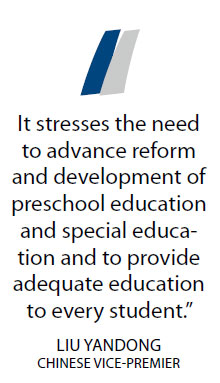

|
Chinese Vice-Premier Liu Yandong (right) addresses a forum on China-US collaboration in early child development held at the Brookings Institution in Washington on Wednesday. The two from left were former US Secretary of State Hillary Clinton and John Thornton, chair of the Brookings' board of trustees. Sun Chenbei / China Daily |

They probably are the two most influential women in China and the United States. On Wednesday they shared a stage and displayed their passion before a packed auditorium as they advocated that tackling challenges in early child development (ECD) should be among top priorities for their nations.
Chinese Vice-Premier Liu Yandong, the most senior woman in the Chinese government, and Hillary Clinton, the former secretary of State who may become the first woman president of the US in 2016, spoke on the issue at a forum on US-China collaboration at the Brookings Institution in Washington.
Liu told the audience of mostly ECD experts from the two countries that for years China has pursued a policy of "putting children first" and adopted a program for the development of women and children that will be completed by 2020.
China has met the United Nations Millennium Development Goals ahead of schedule. The mortality rates for infants and children under-5 have dropped to 10.3 percent and 13.2 percent from 32.2 percent and 39.7 percent, respectively, over the last decade.
Gross enrollment ratio for pre-school education has also increased to 64.5 percent in 2012 from 50.9 percent in 2009. Nine-year free compulsory education now covers both urban and rural areas, with a net enrollment rate more than 99 percent. And in urban areas, nearly 14 million children of migrant workers have access to compulsory education, according to Liu.
Describing China as a developing country with per capita GDP ranking 86th in the world and with 129 million people still living in poverty under the UN criteria, Liu recalled her trip five years ago to the underdeveloped mountain regions in southwest China's Guizhou province and northwest China's Ningxia Hui autonomous region.
"I was so sad to see that some children could not have meals on time because schools were too far away from home and some others were so thin and feeble due to malnutrition," she said.
After an investigation led by Liu, the Chinese government introduced a nutrition-improvement program in 680 counties in poverty-stricken regions that has benefited more than 31 million students.
Such a large-scale nutrition-improvement program has been regarded as unprecedented in China and won high praise from experts at the World Bank and the UN Food Program.
Liu said the Third Plenum of the 18th Central Committee of the Communist Party of China which concluded eight days ago not only demonstrated to the world China's resolve to deepen reform, expand opening-up and pursue peaceful development, it also called for making greater efforts to ensure and improve the well being of the people and promote social equity and justice.
"It stresses the need to advance reform and development of preschool education and special education and to provide adequate education to every student. All these create a better social environment for the development of children," she said.
Liu said she believes there is ample room for cooperation between China and the US in the area because both share the vision and goal of giving priority to children and promoting social fairness, regardless of their different national conditions.
Liu described Hillary Clinton as a passionate advocate of children's causes, noting the inspiration she got from the book It Takes a Village given to her by then-Secretary of State Clinton three years ago. The book, published in 1996 by the then First Lady Clinton, presents her vision for the well being of American children.
Clinton, who again is in the national spotlight for her potential run in the 2016 presidential campaign, echoed Liu's words on the cause of ECD.
"This cause of ECD is close to both our hearts. It's true that we are both mothers. Maybe that gives us a particular perspective," she said.
"It's also because as leaders of our respective nations, we've seen how important it is to attend to our very youngest citizens, to ensure that every child has the best opportunity to succeed in school and life.
"It is not only the right thing to do it is the smart thing as well," she said.
Clinton noted that such causes "may not be in the headlines, but are in the trend lines".
Zhang Kan, a professor at the Institute of Psychology of Chinese Academy of Sciences, said China is facing challenges in ECD in both urban and rural areas.
He described early child development between the ages of 0-3 in rural areas as almost non-existent, partly because there is a lack of knowledge and partly because parents go to work in cities and leave their children behind in villages.
On the contrary, the only child in the family living in cities is often spoiled like a "little emperor," said Zhang, adding that the excessive attention on the children in those families is harmful.
"The early child development between ages 0-3 is largely about emotional development, such as learning how to share with others," he said.
chenweihua@chinadailyusa.com